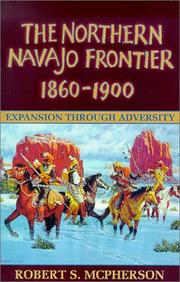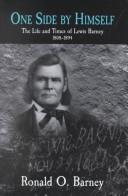| Listing 1 - 10 of 31 | << page >> |
Sort by
|
Book
ISBN: 1927051797 1927051800 Year: 2012 Publisher: Victoria, British Columbia ; Vancouver ; Calgary : Heritage,
Abstract | Keywords | Export | Availability | Bookmark
 Loading...
Loading...Choose an application
- Reference Manager
- EndNote
- RefWorks (Direct export to RefWorks)
Temperance --- Prohibition --- Frontier and pioneer life --- History.
Book
Year: 2005 Publisher: Canberra, Australia : ANU E Press,
Abstract | Keywords | Export | Availability | Bookmark
 Loading...
Loading...Choose an application
- Reference Manager
- EndNote
- RefWorks (Direct export to RefWorks)
Frontier and pioneer life --- Australia --- Historiography. --- History --- Philosophy.
Book
ISBN: 1684450039 0815601174 Year: 1975 Publisher: Syracuse University Press
Abstract | Keywords | Export | Availability | Bookmark
 Loading...
Loading...Choose an application
- Reference Manager
- EndNote
- RefWorks (Direct export to RefWorks)
Writing his full-length reminiscence in a lonely Adirondack cabin during the winter of 1891-92, Henry Conklin recounts the first thirteen years of his life on a farm in Schoharie County, his young manhood in Herkimer County, and his service in the Civil War. The story is one of a hardscrabble life, of farming on marginal land and struggling each day for necessary food and clothing. And yet Conklin asserts that these years were the happiest he knew. The Conklin family was close-knit, loving, and self-sufficient. They built their home, made their own clothing, and grew much of their food. Everyone contributed his or her share to the good of the family group. In this vivid portrayal of family life, we read about ordinary events that are unfamiliar to us today – weaving cloth, churning butter, making shingles, starting a fire with flint and steel, setting traps – and about the technology of the nineteenth century. With insight, humility, and a perspective gained through distance and time, Henry Conklin gives us a dramatic and moving narrative in which we become deeply involved. In telling his story, Conklin is not only reliving the past but also saving the events, experiences, and persons of his life from oblivion, and contributing to our historical knowledge of the rural backwaters of antebellum America. Conklin’s reminiscence was preserved by his son and then by his grandson Roy Conklin, who brought it to the attention of Wendell Tripp. Several engravings supplement the text, and the editor has provided footnotes to many references that may be unclear to present day readers.
Frontier and pioneer life --- Conklin, Henry, --- Childhood and youth. --- Border life --- Homesteading --- Pioneer life --- Adventure and adventurers --- Manners and customs --- Pioneers --- History --- History of the Americas
Book
ISBN: 1922144703 1922144711 9781922144713 9781922144706 Year: 2013 Publisher: Canberra, Australia : ANU E Press,
Abstract | Keywords | Export | Availability | Bookmark
 Loading...
Loading...Choose an application
- Reference Manager
- EndNote
- RefWorks (Direct export to RefWorks)
Edward M. Curr (1820-89) was a pastoralist, horse trader, stock inspector, Aboriginal administrator, author and ethnologist
English Literature --- English --- Languages & Literatures --- Frontier and pioneer life --- Authors, Australian --- Australian authors --- Curr, Edward M.
Book
ISBN: 0700600701 0700630783 Year: 1971 Publisher: University Press of Kansas
Abstract | Keywords | Export | Availability | Bookmark
 Loading...
Loading...Choose an application
- Reference Manager
- EndNote
- RefWorks (Direct export to RefWorks)
The story of the westward expansion of this country does not stop with the hardships encountered by travelers on the Mormon Trail, the discomforts endured by early settlers in sod houses, the bravery of the Pony Express riders, the romantic solitude of the cowboys, or the sufferings of the Indians forced to abandon their homes bleak and alien country. Much has been written about these colorful episodes and, through the courtesy of Hollywood and TV, has been brought into millions of homes in living color. But what happened to the people, including the Indians, who survived the great raid on Fort X, the bitter winters and scorching summers spent in primitive housing, the terrible loneliness and lack of communication with eastern kin? What did migrants do when they reached the end of the Mormon Trail? And did the Cherokees’ Trail of tears become a neverending journey from one “relocation” to another? How did people develop and accommodate themselves to an environment which was itself constantly altered by an everchanging society?In these essays we find that tragedy and joy, victory and defeat, human fulfillment and human degradation are visible in roughly equal proportions in the story of the Americanization of the West: that the goals, both realistic and unrealistic, of one group, society, or culture are frequently pursued only at the expense of other groups; and that the skeletons in the closet of American history abound to a greater extent than a nation convinced of its own virtue is willing to admit. Racism has plagued the nation since its inception, and exploitation of one group by another was sadly a part of the Western frontier. However, there was a freshness and vigor in the history of the West. Young railroads continued to grow, linking productive farms with brawling cities. New businesses and new political parties emerged, all contributing to the growth of the region that Stephen A. Douglas called the “adhesive of the Union.”This is a fascinating collection that serves to illuminate both the tragedies and accomplishments of the westward movement.
Frontier and pioneer life --- West (U.S.) --- History. --- History of the Americas
Book
ISBN: 0773578099 1282850075 9786612850073 0773560106 Year: 2006 Publisher: Montreal : McGill-Queen's University Press,
Abstract | Keywords | Export | Availability | Bookmark
 Loading...
Loading...Choose an application
- Reference Manager
- EndNote
- RefWorks (Direct export to RefWorks)
Northerly locations were desperately sought out after more accessible land further south was taken up. Wood identifies the demographic characteristics of the surging population of land-seekers, showing how some aspects echoed those of earlier settlers. The northern settlers of the interwar years grappled with demanding conditions, which required new adaptations. They were supported in their efforts by politicians, bureaucrats, and religious leaders who had less than innocent reasons for endorsing what were questionable settlement experiments in unopened or abandoned areas. The book includes a series of gripping case studies to illustrate both the face of failure and what appear to have been the ingredients for success in marginal areas.
Farmers --- Frontier and pioneer life --- Land settlement --- Clearing of land --- Agriculturally marginal lands --- History --- Government policy
Book
ISBN: 0816537860 0816512248 Year: 1991 Publisher: Tucson : University of Arizona Press,
Abstract | Keywords | Export | Availability | Bookmark
 Loading...
Loading...Choose an application
- Reference Manager
- EndNote
- RefWorks (Direct export to RefWorks)
Frontier and pioneer life --- Barter --- Pueblo Indians --- History. --- Agriculture. --- Commerce. --- Indians of North America --- In-kind exchange --- Payment-in-kind --- Exchange --- Local exchange trading systems --- Border life --- Homesteading --- Pioneer life --- Adventure and adventurers --- Manners and customs --- Pioneers --- History

ISBN: 0874214246 9786613267412 1283267411 0874216710 9780874216714 9780874214246 Year: 2001 Publisher: Logan, Utah Utah State University Press
Abstract | Keywords | Export | Availability | Bookmark
 Loading...
Loading...Choose an application
- Reference Manager
- EndNote
- RefWorks (Direct export to RefWorks)
McPherson argues that, instead of being a downtrodden group of prisoners, defeated militarily in the 1860s and dependent on the U.S. government for protection and guidance in the 1870s and 80s, the Navajo nation was vigorously involved in defending and expanding the borders of their homelands. This was accomplished not through war nor as a concerted effort, but by an aggressive defensive policy built on individual action that varied with changing circumstances. Many Navajos never made the Long Walk to Bosque Redondo. Instead they eluded capture in northern and western hinterlands and ther--
Frontier and pioneer life - Southwest, New. --- Frontier and pioneer life -- Southwest, New. --- Indians of North America -- Southwest, New -- Captivities. --- Indians of North America -- Southwest, New -- Wars. --- Navajo Indians -- Captivities. --- Navajo Indians - History. --- Navajo Indians - Land tenure. --- Navajo Indians -- Wars. --- Gender & Ethnic Studies --- Social Sciences --- Ethnic & Race Studies --- Navajo Indians --- Frontier and pioneer life --- History. --- Land tenure. --- Diné Indians (Navajo) --- Navaho Indians --- Athapascan Indians --- Indians of North America

ISBN: 0874214270 0874214289 9786613266965 1283266962 0874214726 9780874214727 9780874214277 9780874214284 Year: 2001 Publisher: Logan Utah State University Press
Abstract | Keywords | Export | Availability | Bookmark
 Loading...
Loading...Choose an application
- Reference Manager
- EndNote
- RefWorks (Direct export to RefWorks)
""What an astonishing life and what a remarkable biography. Lewis Barney's sojourn on the hard edge of the American frontier is a forgotten epic. Not only does this book tell of an amazing personal odyssey from his birth in upstate New York in 1808 to his death in Mancos, Colorado, in 1894, but Barney's tale represents a living evocation of some of the most significant themes in American history. Frederick Jackson Turner theorized that the frontier shaped our national character, but Lewis Barney's life stands as a testament to the real impact of the westering experience on a man and his f
Mormon pioneers --- Mormon Church --- Barney, Lewis, --- Utah --- Frontier and pioneer life --- History --- West (U.S.) --- Pioneers --- Latter Day Saint churches --- Latter Day Saint pioneers --- Mormonism --- Christian sects
Book
ISBN: 1574416014 9781574416015 9781574415926 1574415921 Year: 2015 Publisher: Denton, Texas University of North Texas Press
Abstract | Keywords | Export | Availability | Bookmark
 Loading...
Loading...Choose an application
- Reference Manager
- EndNote
- RefWorks (Direct export to RefWorks)
Frontier and pioneer life --- Jones, Frank, --- Texas Rangers. --- Texas Rangers of Company D --- Texas Ranger Company D --- Company D of the Texas Rangers --- E-books
| Listing 1 - 10 of 31 | << page >> |
Sort by
|

 Search
Search Feedback
Feedback About UniCat
About UniCat  Help
Help News
News